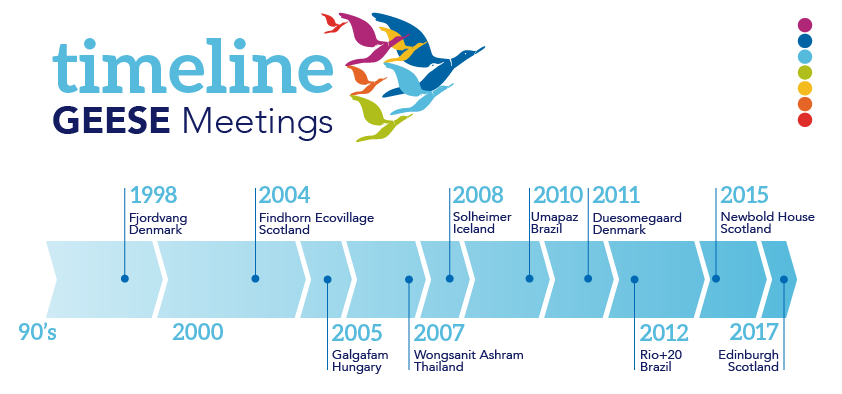Gaia Education History
Gaia Education was created by a group of educators called ‘GEESE’ – Global Ecovillage Educators for a Sustainable Earth – who had been meeting over a series of workshops in order to formulate their transdisciplinary approach to education for sustainability.
The GEESE first met in 1998 in Fjorvang, Denmark where the common ground for the development of the ecovillage design curriculum was established. The first milestone in the development of Gaia Education was the launch of the innovative curriculum, Ecovillage Design Education, during the tenth anniversary conference of the Global Ecovillage Network at the Findhorn Ecovillage in October 2005.
In 2008, Gaia Education Design for Sustainability (GEDS) online programme was launched in partnership with Open University of Catalonia (UOC). Initially offered in Spanish and English, the course attracted students from both developed and developing countries, rural and urban regions, on five continents.
In 2011, the Spanish Gaia Education Design for Sustainability became a formal postgraduate course, attracting mostly Spanish and Latin American students. Since then, Gaia Education has converted the GEDS postgraduate Spanish course into a Masters degree.
In 2013, Gaia Education started to offer GEDS in Portuguese, as part of its online learning platform, where it has also been possible to take the GEDS course in English since 2014.
In 2014, Gaia Education developed the new stream of activity Project Based Learning, supporting community-led implementation of the Sustainable Development Goals.

Since 2006, Gaia Education has successfully supported the delivery of more than 300 programmes on six continents. Internationally, the number of four-week long intensives and other course formats are increasing steadily along with a sharp increase in the number of applicants and participants on these courses. These vocational courses are open to a diverse group of people with a wide range of professional and academic backgrounds who are interested in taking an active role in the sustainability transition.
VISION
A world of resilient, deeply connected, and bioregionally responsible communities thriving through regenerative practices.
MISSION
We support the co-creation of regenerative cultures by providing transformative educational programmes and project-based learning for individuals and organisations leading systemic change.
IMPACT
Communities all around the world have improved their social and natural systems using Gaia Education 4-D Whole Systems framework, so that they thrive within planetary boundaries, regenerate the natural environment and allow all human potential to flourish.

